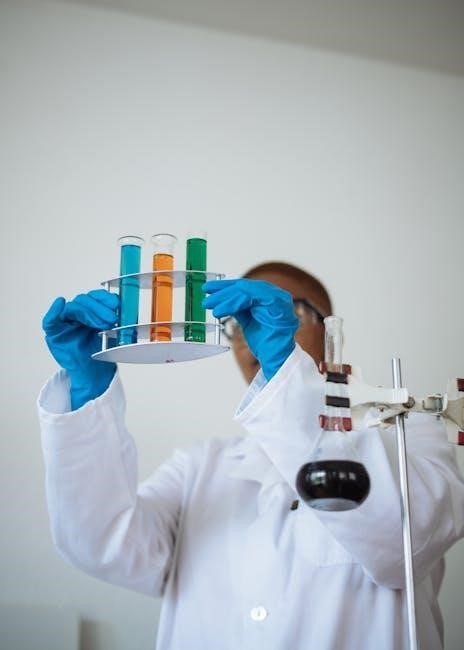Pharmacology is the scientific study of drugs, their mechanisms, and effects on living organisms․ It explores drug origins, chemistry, and therapeutic applications, essential for medicine and healthcare;
1․1 Definition and Scope of Pharmacology
Pharmacology is the study of drug actions, origins, and effects on biological systems․ It encompasses drug discovery, pharmacokinetics, and therapeutic uses, focusing on how drugs interact with the body to prevent, diagnose, or treat diseases, making it a cornerstone of modern medicine and healthcare․
1․2 Importance of Pharmacology in Medicine
Pharmacology plays a crucial role in medicine by advancing drug therapy, improving patient outcomes, andpersonalizing treatments․ It aids in understanding drug interactions, efficacy, and safety, ensuring optimal therapeutic regimens and minimizing adverse effects, thus enhancing healthcare quality and saving lives․
1․3 Key Concepts in Pharmacology
Key pharmacology concepts include pharmacokinetics, pharmacodynamics, and drug-receptor interactions․ These principles explain how drugs are absorbed, distributed, metabolized, and excreted, and how they interact with biological systems to produce therapeutic effects, forming the foundation for understanding drug mechanisms and applications․
Pharmacokinetics and Pharmacodynamics
Pharmacokinetics examines drug absorption, distribution, metabolism, and excretion, while pharmacodynamics studies drug effects and receptor interactions․ Together, they explain how drugs work in the body․
2․1 Absorption, Distribution, Metabolism, and Excretion (ADME)
ADME processes determine drug concentration and effectiveness․ Absorption involves drug uptake into the bloodstream, while distribution carries drugs to target tissues․ Metabolism breaks drugs down, often in the liver, and excretion eliminates them via kidneys or bile․ These processes influence drug efficacy, toxicity, and duration of action․
2․2 Drug-Receptor Interactions
Drug-receptor interactions involve drugs binding to specific cellular receptors, triggering biological responses․ Ligands, such as drugs, bind to receptors with varying affinity, influencing efficacy․ Agonists activate receptors, while antagonists block them․ These interactions determine therapeutic effects, side effects, and drug specificity, forming the basis of pharmacotherapy and drug development strategies․
2․3 Dose-Response Relationships
Dose-response relationships describe how drug effects vary with dosage․ Graded responses occur in individuals, while quantal responses measure population effects․ The therapeutic index compares effective and toxic doses, guiding safe prescribing․ Understanding these relationships optimizes treatment efficacy and minimizes adverse effects, crucial for clinical practice and drug development․

Drug Classification and Terminology
Drugs are classified by therapeutic use, chemical structure, or pharmacological effect․ Terminology includes generic names, trade names, and chemical names, aiding in precise identification and prescribing․
3․1 Classification of Drugs by Therapeutic Use
Drugs are categorized by their therapeutic use, such as anti-inflammatory, cardiovascular, or neurological agents․ This classification helps identify appropriate treatments for specific conditions, ensuring targeted therapy and minimizing adverse effects․ It aids healthcare professionals in selecting medications based on their intended therapeutic outcomes, enhancing patient care and safety․
3․2 Classification of Drugs by Chemical Structure
Drugs can be classified based on their chemical structure, such as penicillins or statins․ This grouping helps identify shared properties, like pharmacokinetics or mechanisms of action․ It aids in understanding drug interactions and designing new therapies, making it a valuable tool for both research and clinical applications in pharmacology․
3․3 Generic and Trade Names of Drugs
Drugs are identified by generic names, based on their chemical structure, and trade names, which are brand-specific․ For example, ibuprofen is the generic name, while Advil is a trade name․ Understanding both names is crucial for safe prescribing, dispensing, and patient education in pharmacology practice and study materials․

Therapeutic Areas in Pharmacology
Therapeutic areas in pharmacology focus on specific body systems, such as cardiovascular, neurologic, and renal, addressing drug actions, disease management, and targeted therapies for optimal patient outcomes․
4․1 Cardiovascular Pharmacology
Cardiovascular pharmacology examines drugs affecting heart and blood vessels, addressing hypertension, heart failure, and atherosclerosis․ Medications like ACE inhibitors, beta-blockers, and statins are studied for their roles in managing cardiovascular diseases, improving circulation, and preventing complications․
4․2 Neuropharmacology and the Autonomic Nervous System
Neuropharmacology explores drugs affecting the nervous system, particularly the autonomic nervous system, which controls involuntary functions․ It examines neurotransmitters like acetylcholine and norepinephrine, and drugs that modulate their activity, offering treatments for conditions like hypertension, anxiety, and neurological disorders by targeting sympathetic or parasympathetic responses․
4․3 Renal and Blood Pharmacology
Renal pharmacology focuses on drugs affecting kidney function, treating conditions like hypertension, edema, and renal failure․ Blood pharmacology involves drugs managing blood disorders, such as anemia and clotting diseases․ Diuretics, anticoagulants, and erythropoietin are key examples, essential for maintaining renal health and preventing complications in blood-related illnesses․

Drug Safety and Adverse Effects
Drug safety focuses on minimizing adverse effects, toxicity, and drug interactions․ Monitoring and safe prescribing practices are crucial to manage risks and ensure therapeutic benefits for patients․
5․1 Side Effects and Toxicity
Side effects and toxicity are unintended drug reactions, ranging from mild to severe․ Common side effects include gastrointestinal issues or dizziness, while toxicity can lead to organ damage․ Monitoring and patient education are critical to mitigate risks and ensure safe drug administration, balancing therapeutic benefits with potential harms․
5․2 Drug Interactions and Contraindications
Drug interactions occur when medications affect each other’s efficacy or safety․ Contraindications are conditions where a drug should be avoided․ Both can lead to adverse effects, requiring careful patient assessment and monitoring to prevent complications and ensure safe, effective treatment tailored to individual health profiles․
5․3 Pharmacovigilance and Safe Prescribing Practices
Pharmacovigilance involves monitoring drug safety to detect and prevent adverse effects․ Safe prescribing practices require healthcare providers to follow evidence-based guidelines, use up-to-date formularies, and communicate risks to patients, ensuring medications are used appropriately and effectively while minimizing harm and optimizing therapeutic outcomes for all patients․

Pharmacology Study Guide Resources
Access free pharmacology study guides, including PDFs like Principles of Pharmacology ⎯ Study Guide and Medical Pharmacology at a Glance, offering comprehensive learning materials for students and professionals․
6․1 Free PDF Resources for Pharmacology Study
Find free pharmacology study guides like Principles of Pharmacology ⎼ Study Guide and Medical Pharmacology at a Glance․ These PDF resources cover drug mechanisms, therapeutic uses, and key concepts, offering comprehensive learning materials for students and professionals․ They are available for download on various educational and medical websites․
6․2 Recommended Textbooks and Online Materials
Recommended textbooks include Principles of Pharmacology ⎯ Study Guide and Medical Pharmacology at a Glance․ Online materials like Pharmacology Study Notes and Nurse Study Notes Pharmacology provide in-depth coverage of drug mechanisms, therapeutic uses, and clinical applications․ These resources are available on educational websites for easy access and learning․
6․3 Nursing Pharmacology Study Notes and Guides
Nursing pharmacology guides focus on drug administration, side effects, and interactions․ Resources like Nurse Study Notes Pharmacology and Brunner Med Surg Study Guide offer practical insights․ These materials, available in PDF and digital formats, include study questions and real-world examples to enhance understanding and application in clinical settings․

Clinical Applications of Pharmacology
Clinical pharmacology involves drug administration, monitoring, and case studies․ Resources like Enoxaparin: Prescribing, Administration, and Monitoring provide practical insights, aiding healthcare professionals in effective drug management and patient care․
7․1 Drug Administration Routes and Methods
Drug administration routes include oral, intravenous, subcutaneous, and topical methods․ Each route affects drug absorption and efficacy․ Resources like Enoxaparin: Prescribing, Administration, and Monitoring provide detailed guidance, ensuring safe and effective drug delivery tailored to patient needs and medical conditions․
7․2 Monitoring Drug Effects and Responses
Monitoring drug effects involves observing therapeutic responses and detecting side effects․ Tools like Enoxaparin: Prescribing, Administration, and Monitoring guide healthcare providers in assessing drug efficacy and safety․ Regular monitoring ensures optimal dosing, minimizes adverse reactions, and improves patient outcomes, aligning with therapeutic goals and patient safety standards․
7․3 Case Studies in Clinical Pharmacology
Case studies provide real-world insights into drug effects and patient responses․ Examples include Enoxaparin administration and kavalactones research, demonstrating practical applications of pharmacological principles․ These studies help clinicians understand therapeutic outcomes, manage side effects, and optimize treatment plans, enhancing patient care and safety in diverse clinical scenarios․
Molecular and Experimental Pharmacology
Molecular pharmacology explores drug-receptor interactions and signaling pathways․ It involves studying how drugs modulate cellular processes, enabling the development of targeted therapies and personalized medicine approaches․
8․1 Receptor Pharmacology and Signal Transduction
Receptor pharmacology focuses on how drugs interact with cellular receptors, triggering signal transduction pathways․ These interactions regulate physiological responses, influencing drug efficacy and therapeutic outcomes․ Understanding receptor mechanisms is crucial for developing targeted therapies and optimizing drug design․
8․2 Pharmacogenomics and Personalized Medicine
Pharmacogenomics studies how genetic variations influence drug responses, enabling personalized medicine․ By analyzing individual genetic profiles, healthcare providers can tailor treatments to maximize efficacy and minimize adverse effects, revolutionizing patient care and drug therapy approaches․
8․3 Experimental Models in Pharmacological Research
Experimental models, including in vitro and in vivo studies, are crucial for understanding drug mechanisms, efficacy, and toxicity․ These models simulate human conditions, enabling researchers to test hypotheses and predict clinical outcomes, ultimately advancing drug development and therapeutic applications․

Pharmacology and Drug Development
Pharmacology and drug development involve the discovery, testing, and approval of drugs․ This process ensures safety, efficacy, and therapeutic benefits, guiding medicine advancement․
9․1 The Drug Discovery Process
The drug discovery process is the scientific journey of identifying and developing new drugs․ It involves target identification, compound screening, lead optimization, preclinical testing, and clinical trials․ Each stage ensures safety and efficacy, guiding the creation of effective therapeutic agents․ Study guides provide detailed insights, aiding students in mastering these steps and understanding pharmacology’s role in advancing medicine․
9․2 Clinical Trials and Drug Approval
Clinical trials evaluate drug safety and efficacy in humans, progressing through phases to ensure thorough testing․ Regulatory agencies like the FDA review data for approval, balancing safety and therapeutic benefits․ Pharmacology study guides detail these processes, aiding students in understanding the rigorous journey from discovery to patient access, emphasizing ethical and scientific standards․
9․3 Ethical Considerations in Pharmacology Research
Ethical considerations in pharmacology research ensure the protection of human and animal rights․ Informed consent, confidentiality, and minimizing harm are prioritized․ Researchers must adhere to strict guidelines, with oversight by regulatory bodies like the FDA․ Balancing scientific progress with ethical responsibilities is crucial to maintain trust and integrity in drug development and clinical practices․
Study Tips and Exam Preparation
Active learning, practice questions, and time management are key․ Use free PDF guides to reinforce concepts and engage with online resources for better retention and exam success;
10․1 Effective Learning Strategies for Pharmacology
Break down complex topics into smaller sections using free PDF guides․ Focus on understanding drug mechanisms and interactions․ Engage in active learning through practice questions and flashcards to enhance retention․ Regular review and application of concepts improve comprehension and exam performance significantly․
10․2 Practice Questions and Study Answers
Utilize free PDF resources containing practice questions to test knowledge and identify weak areas․ Review detailed study answers to clarify concepts and improve understanding․ Regularly solving pharmacology questions enhances problem-solving skills and prepares for exams effectively, ensuring a strong grasp of key principles and drug-related information․
10․3 Time Management for Exam Success
Effective time management is crucial for exam success․ Allocate dedicated blocks for studying, practicing questions, and reviewing notes․ Use pharmacology study guides to prioritize topics and create a structured schedule, ensuring efficient use of time․ Regular breaks and consistent study habits enhance productivity and improve retention of key concepts and drug details․
Free Pharmacology Study Guide Downloads
Access free pharmacology study guides in PDF format online, offering comprehensive study materials, practice questions, and detailed drug information for efficient learning and exam preparation․
11․1 Websites Offering Free Pharmacology PDFs
Websites like Google Scholar, PubMed, and ResearchGate offer free pharmacology PDFs, including study guides, research papers, and lecture notes․ These platforms provide easy access to peer-reviewed articles and educational materials, making them invaluable for students and professionals seeking high-quality pharmacology resources online․
11․2 How to Access and Utilize Free Study Materials
To access free pharmacology study materials, search academic platforms like Google Scholar or ResearchGate using keywords like “pharmacology study guide PDF free․” Download from reputable sources, organize files by topic, and use keyword searches for specific content․ Always reference original authors and use materials for educational purposes to ensure ethical use․
11․3 Legal and Ethical Considerations for Free Resources
Using free pharmacology resources requires adherence to copyright laws, as unauthorized distribution is illegal․ Always verify the source’s legitimacy and ensure proper citation․ Respect licensing terms, such as Creative Commons, and use materials solely for educational purposes, avoiding commercial exploitation․ Ethical use promotes academic integrity and supports content creators․
Pharmacology continues to evolve, offering personalized therapies and advanced treatments․ Future research focuses on molecular mechanisms and innovative drug development, shaping healthcare’s next generation of solutions and discoveries․
12․1 The Evolving Field of Pharmacology
Pharmacology is rapidly advancing, driven by molecular biology and personalized medicine․ New drug discovery techniques and genomics are transforming treatment approaches, offering tailored therapies and improving patient outcomes․ This evolution ensures pharmacology remains at the forefront of medical innovation and healthcare advancement, addressing unmet needs effectively․
12․2 Emerging Trends in Pharmacological Research
Emerging trends include precision medicine, gene therapy, and AI-driven drug discovery․ These advancements aim to enhance drug efficacy, reduce toxicity, and personalize treatments․ Pharmacogenomics and biomarker research are pivotal, enabling tailored therapies and improving patient outcomes, while fostering innovation in healthcare and biomedical sciences․
12․3 The Role of Pharmacology in Future Healthcare
Pharmacology will drive advancements in personalized medicine, targeted therapies, and disease management․ By integrating pharmacogenomics and precision medicine, it will enable tailored treatments, improving patient outcomes․ Innovations in drug discovery and development will address chronic and infectious diseases, shaping the future of healthcare and global well-being․
